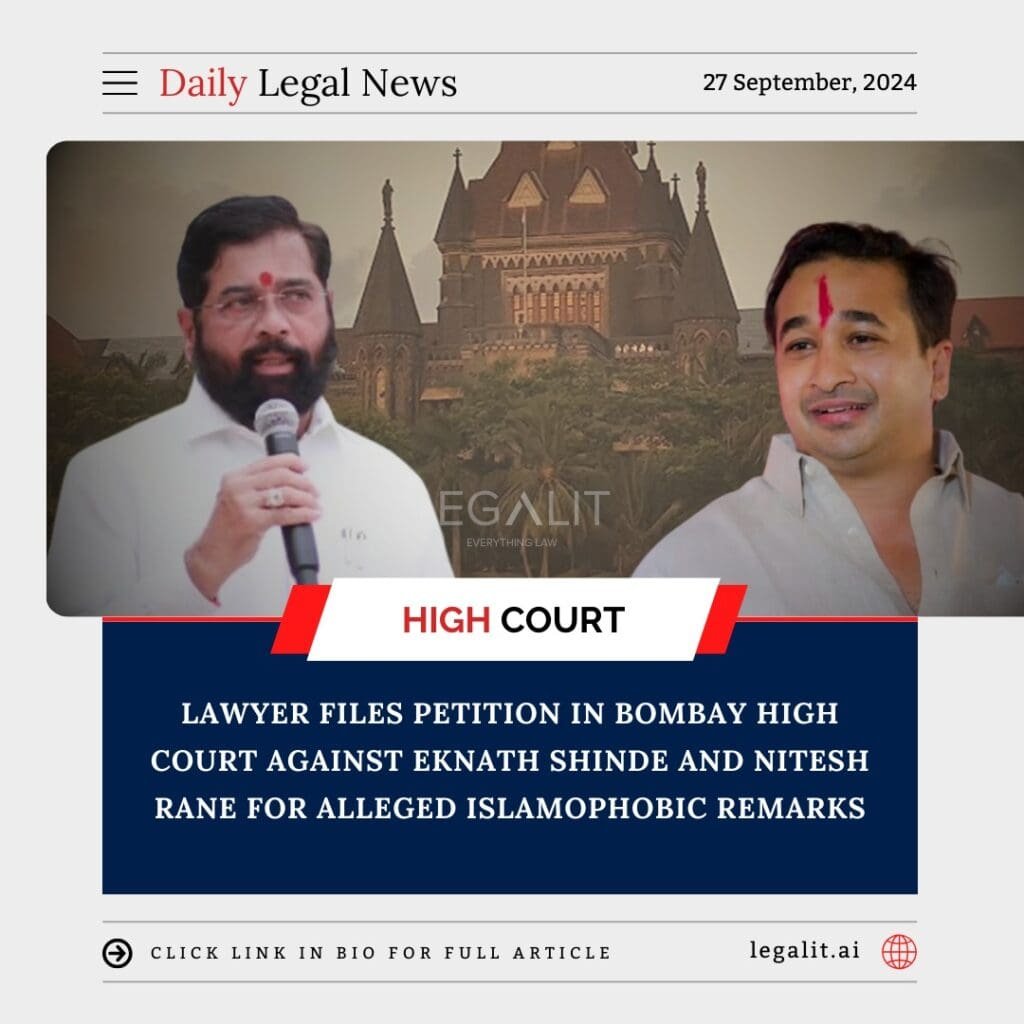
A lawyer has moved the Bombay High Court seeking legal action against Maharashtra Chief Minister Eknath Shinde and BJP MLA Nitesh Rane for allegedly making Islamophobic remarks. The petition urges the Court to take action against the two political leaders for promoting hatred and religious intolerance, which is in violation of constitutional principles.
1. Background of the Petition
The petition was filed following recent speeches by both Eknath Shinde and Nitesh Rane, which the petitioner claims were inflammatory and targeted the Muslim community. The lawyer argues that such statements not only harm the secular fabric of the country but also incite violence and create divisions between communities. The petition points out that public figures hold a significant responsibility and that their words can have a far-reaching impact on social harmony.
The complaint asserts that the alleged remarks were made during public rallies and speeches, wherein the leaders reportedly used language that painted a negative image of the Muslim community. According to the petitioner, these statements were aimed at creating an atmosphere of hatred and fear, violating Section 153A of the Indian Penal Code, which deals with promoting enmity between different religious groups.
2. Allegations Against Eknath Shinde and Nitesh Rane
The lawyer’s petition highlights specific incidents where both Eknath Shinde and Nitesh Rane allegedly made Islamophobic comments. These remarks, according to the petition, portrayed Muslims in a derogatory manner, thus violating the constitutional values of equality, dignity, and religious freedom.
The petitioner has urged the Court to direct the police to register FIRs against both leaders and initiate an investigation into their statements. The plea further seeks legal action under various provisions of the IPC that deal with hate speech, religious intolerance, and incitement to violence.
3. Legal Provisions Involved
The petition invokes several sections of the Indian Penal Code (IPC) that address hate speech and religious intolerance, including:
- Section 153A: Promoting enmity between different groups on grounds of religion, race, place of birth, residence, language, etc., and doing acts prejudicial to the maintenance of harmony.
- Section 295A: Deliberate and malicious acts intended to outrage religious feelings by insulting religion or religious beliefs.
- Section 505(2): Making statements that create or promote enmity, hatred, or ill-will between different communities.
The lawyer argues that the remarks made by Shinde and Rane fall under these provisions and necessitate strict legal action to prevent further harm to communal harmony.
4. Impact on Social Harmony
The petition raises concerns about the broader social impact of such statements made by influential leaders. It highlights the potential dangers of hate speech, especially in a multi-religious country like India, where communal tensions can escalate rapidly. The petitioner argues that statements like those allegedly made by Shinde and Rane could fuel hatred and lead to communal violence, disrupting peace and order.
The plea also points to the importance of holding public officials accountable for their words and actions, emphasizing that leaders must adhere to the principles of secularism and equality enshrined in the Indian Constitution.
5. Conclusion: Upholding Constitutional Values
The petition against Eknath Shinde and Nitesh Rane serves as a reminder of the responsibilities of public figures in a diverse and secular nation like India. The Bombay High Court will now decide whether the remarks in question merit legal action under the provisions of the Indian Penal Code.
If the Court rules in favor of the petitioner, it could lead to significant legal repercussions for both political leaders and set a precedent for addressing hate speech by public figures. The case underscores the importance of protecting India’s secular fabric and ensuring that no community is targeted or discriminated against based on religion.